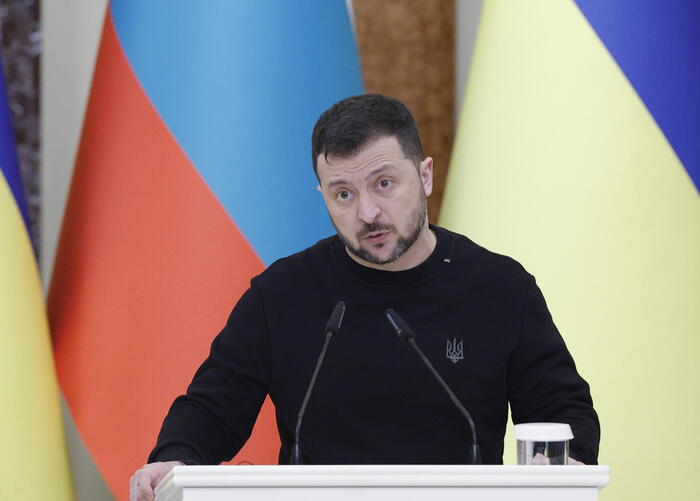The Gärtnerplatztheater transplanted the "cousin from Dingsda" into the 1960s.
But the evening is not as flashy and weird as the furnishings seem.
Künneke's operetta is only available as an Internet premiere and a short-term stream, the house is hoping for live performances in February.
The directing team proliferates with shrill equipment from the cheese hedgehog to the garden gnome and a sloping bungalow to Delial sun milk.
Only rarely does the performance really rise to higher levels of nonsense and nonsense.
It seldom happens that an operetta breaks all the bars.
That of logic, that of the tolerably formulated text, that of sexism, especially that of #MeToo.
But actually “The Cousin from Dingsda” was thought differently.
As a cheeky little thing
(see plot below)
, as a chamber piece, which was only later pumped up with stars to become a war and post-war pick-me-up.
In this respect, it basically fits, what makes the Gärtnerplatztheater rise in the ditch as an Internet premiere with 19 fast-paced to research orchestra members under conductor Andreas Kowalewitz.
Retelling Eduard Künneke's piece, which was premiered in 1921, from a sheet of paper?
So it doesn't work at all.
Director Lukas Wachernig therefore transplanted the two-hourer into a Plemplem time that is closer to us, namely the sixties.
A retro explosion in which everything is right thanks to Judith Leikauf and Karl Fehringer (stage) and Dagmar Morell (costumes).
From garden gnomes to cheese hedgehogs, mini skirts and bungalow quotes with a curved pool to Delial sun milk, whose presumed mini protection factor guarantees full melanomas.
There is also a caricature parade, among others with Erwin Windegger, who gives Josef Kuhbrot as the angry Reiner Calmund, Daniel Gutmann as Egon with a Mathieu wig and Maximilian Mayer, his “first stranger”, that is, August, the Berlin Union film studios with Heck's “hit parade “Seems to have run away.
When the juices rise, you can clamp the inflatable palm tree in front of the pool as a giant stick.
And when everyone sucks on the water pipe with forbidden additives, the evening turns into delirium and - finally - reaches that Gaga-Dada overkill that the equipment leads to believe.
The diaphragm is not exactly stressed
Because: The back and forth movement of the "cousin" is not necessarily a burden on the diaphragm.
With his work, Wachernig aims at over-revving up to the operetta piston eater, but takes text and music far too seriously.
"Child, you don't have to think too much.
Kiss me and everything will be fine “- thanks to Maximilian Mayer's splendid tenor, that comes across the ramp so unadulterated and unbroken, as if he were sitting between velvet and plush.
Judith Spießer, who waves through the part of Juliet with a polished soprano, seems a bit too cold.
Maybe because she doesn't even know what happens to her in this environment.
The antennas of Julia Sturzlbaum (Hannchen), Daniel Gutmann (Egon), Stefan Bischoff (second stranger and thus Roderich) are quite shrill.
Wachernig could have used a lot more of the potential of these nature comedians.
Dagmar Hellberg and Erwin Windegger also bustle through the picture as lightweight bang-out batches despite their fatsuit.
Only rarely does everything rise to the higher nonsense and nonsense that the director obviously intended - and to which the libretto (“The suit from your brother, give it again, you bitch”) invites you.
It may be that all this is communicated differently in the house, where members of the theater team bravely cheer against the void.
The recording can only be accessed until late Sunday evening - also for reasons of publishing law.
At the end of February there are “real” performances in the program.
One hopes.
In fact, Künneke's operetta isn't quite as poor in content as the production leads to believe.
Coloring in how the "right one" has to be, the abyss between hope and reality, longing that always bears the germ of the unreal, even guys who are far from home (the piece came out three years after the end of the world war) - Wagner has already dealt with that, admittedly deadly serious, in the “Flying Dutchman”.
There is much that is illuminating to read in the program booklet available online.
It seems like the essay subtly undermines the performance.
The plot:
Julia is the sole heir to a castle.
Uncle and aunt want to pair her up with her nephew August in order to gain access to the inheritance.
Julia wants to remain loyal to her missing childhood friend Roderich.
A stranger pretends to be Roderich, it's August, and they both fall in love.
When everything is exposed, Julia sadly rejects him.
A second stranger appears, it is the real Roderich - with whom Julia's friend Hannchen has a crush.
At some point everything will be cleared up.
Roderich confesses to Julia that he was never in love with her.
So she takes August, Hannchen gets Roderich.
Recording
until this Sunday, 11 p.m., at gaertnerplatztheater.de;
further performances planned from the end of February.







